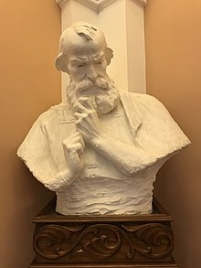Anania Shirakatsi
Friday, March 15, 2024
Anania Shirakatsi was a 7th-century Armenian polymath and natural philosopher, author of extant works covering mathematics, astronomy, geography, chronology, and other fields.
Little is known for certain of his life outside of his own writings, but he is considered the father of the exact and natural sciences in Armenia—the first Armenian mathematician, astronomer, and cosmographer.
Seen as a part of the Armenian Hellenizing School, the last lay scholar in Christian Armenia until the 11th century, Anania was educated primarily by Tychicus, in Trebizond. He composed science textbooks and the first known geographic work in classical Armenian (Ashkharhatsuyts), which provides detailed information about Greater Armenia, Persia and the Caucasus (Georgia and Caucasian Albania).
In mathematics, his accomplishments include the earliest known table of results of the four basic operations, the earliest known collection of recreational math puzzles and problems, and the earliest book of math problems in Armenian. He also devised a system of mathematical notation based on the Armenian alphabet, although he was the only writer known to have used it.
Anania Shirakatsi lived in the 7th century. The dates of his birth and death have not been definitively established. Robert H. Hewsen noted in 1968 that Anania is widely believed to have been born between 595 and 600; a quarter-century later he settled on c. 610 as a birthdate and 685 as the year he died. Agop Jack Hacikyan places his birth in early 600s but agrees on 685. Edward G. Mathews and Theo van Lint also concur with 610–685, while Greenwood suggests c. 600–670. Vardanyan places his death in the early 690s.
Anania is the only classical Armenian scholar to have written an autobiography. It is a brief text, characterized as "somewhat self-congratulatory" and "more a statement of academic pedigree" than autobiography. It was probably written as the preface to one of his scholarly works, possibly the K'nnikon. He was the son of John (Yovhannes; Յովհաննէս) and was born in the village of Anania/Aneank' (Անեանք) or in the town of Shirakavan (Yerazgavors) (Շիրակաւան), in the canton of Shirak (Širak), in the central Armenian province of Ayrarat. Aneank' may be connected to the later city of Ani, the Bagratid Armenian capital.
Anania probably came from a noble family. Since his name is sometimes spelled as "Shirakuni" (Շիրակունի), Hewsen argued that he may have belonged to the house of the Kamsarakan or Arsharuni princes of Shirak and Aršarunik’, respectively. Greenwood suggests that it is more likely that Anania came from the lesser nobility in Shirak, who served the house of Kamsarakan. Broutian describes his father as a "minor Armenian nobleman." Vardanyan believes he either came from the Kamsarakan family or that they were his patrons.
Anania is traditionally thought to have been buried in the village of Anavank', however, the tradition probably originated from the name of the village.
Anania had a close relationship with the church. Several scholars consider him a church ideologist akin to Cosmas Indicopleustes, whom he actually criticized. Hacikyan describes Anania as a "devout Christian and well versed in the Bible" who "made some attempts to reconcile science and Scripture." In his later years, Anania may have been a monk in the Armenian Church. This is based on his religious discourses and attempts to date the feasts of the church. On the other hand, John A. C. Greppin doubts that Anania was ever in any religious order.
Hewsen noted that some of Anania's "more revolutionary ideas" were suppressed by the Armenian Church after his death. Greppin noted that Anania, a largely secular author, had fallen into a "bad clerical odor." Soviet historians represented him as a founder of irreligious and anti-clerical thought in Armenia, who pioneered double-truth theory. Gevorg Khrlopian went as far as to argue that Anania was an enemy of the Armenian Church and fought against its obscurantism. Hewsen opposed this view, suggesting that, instead, he was an "independent thinker of sorts."





